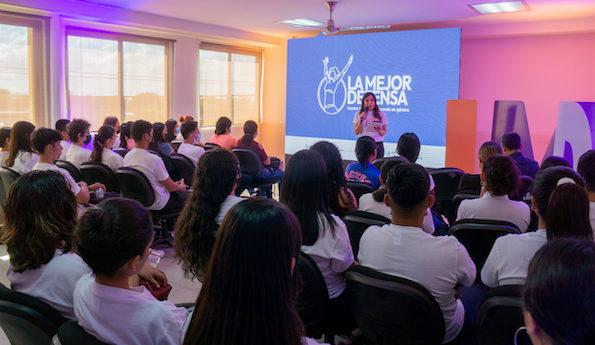Corruption undermines the foundation of societies, eroding trust in institutions, depriving communities of critical public resources, and hindering economic growth. It discourages foreign investment, stifles innovation, and creates an uneven playing field for businesses. El Salvador has recently faced a series of significant challenges in transparency that affect the country’s ability to prevent and combat corruption. Reduced accountability to citizens increases risks of poor public management and the potential for impunity for corruption.
In this context, Counterpart International’s Transparency and Integrity Activity in El Salvador, funded by USAID, has made important strides. The project celebrated its one-year anniversary on November 22, 2024, with a public event featuring the signing of the Compromiso por la Integridad Publica (Commitment to Public Integrity), an agreement between six partner national government agencies, five municipalities, the U.S. Embassy, and Counterpart, reaffirming a mutual promise to promote transparency, and integrity with the aim of fighting corruption in the country. The event featured opening remarks from the U.S. Ambassador to El Salvador William Duncan, a panel discussion with leaders from the National Ethics Tribunal, Public Defender’s Office, San Miguel municipality, and Chamber of Commerce and Industry of El Salvador, and even an artwork exhibit from university students.

Milagro Navas, Mayor of La Libertad Este, signing the “Commitment to Public Integrity,” an agreement in which participants reaffirm their willingness to promote ethics and integrity to build stronger institutions at the service of Salvadoran citizens.
The project has formed strategic alliances with key government anti-corruption institutions and civil society to support major policy reforms, such as implementation of the anti-bribery management system, and processes that enhance institutional integrity at the national and municipal levels. Working with local partners, the project laid the foundation for improving the efficiency and accountability of public services and ensuring that ethics and integrity are central to all government functions.
Promoting Public Sector Ethics Codes and Strengthening Anti-Bribery Systems
This past year, our team trained 1,339 government officials from various institutions on ethics, integrity, public procurement, and anti-corruption, including offering a dedicated ethics certificate course for public officials. The trainings introduced new tools for identifying corruption risks and approaches to develop corruption prevention strategies. “The ethics diploma has helped us to understand in depth the Government Ethics Law and has taught us that there must be a change of culture, and the first agents of change must be those of us who are in the Ethics Commission. What we are looking for is that all of us who work in public service, serve our users well, that we do it in the correct, ethical and transparent manner so that everyone can carry out their processes,” says Julio Castellanos, member of the Ethics Commission of the Ministry of Education.

Seven public institutions and four Salvadoran municipalities signed a “Public Integrity Commitment” during the project’s anniversary event.
The project supported the creation of 49 institutional codes of ethics, in collaboration with the National Ethics Tribunal, and the implementation of the Integrity and Anti-Bribery Management System, working with five national institutions and five municipalities. As a result, partners are now more adept at identifying systemic weaknesses and ensuring that public services are more efficient and accountable.
We also focused on the importance of women’s civic participation, supporting the Public Defender’s Office’s “Permanent Dialogue with Women Leaders” initiative to enhance accountability, responsiveness, and impact for women stakeholders.

The swearing in of the Ethics Commission of the Public Defender General’s Office, during the signing of an agreement between the Activity and the Public Defender General’s Office in June 2024.
Supporting Civil Society and Private Sector Support for Accountability
This past year, our team strengthened citizen participation and the capability of civil society organizations to monitor and advocate for greater public transparency and accountability. We trained 21 civil society leaders on specialized anti-corruption topics to foster a more active, informed, and engaged civil society. We held a series of workshops for media outlets and journalists to enhance public messaging about the importance of accountability to citizens and democratic values. “With the use of pro-democracy narratives, we have been able to connect with other audiences that did not identify with the organization. Now the audiences identify with the values we are communicating—values that we all defend. Our online publications have increased reach and improved in interactions,” said the communications director of a civil society partner.
The project fostered collaboration between universities, think tanks, the private sector, and government agencies, by supporting dialogues, training courses, and coordinated awareness campaigns, such as the Public Ethics Week, which contributed to the sharing of best practices but also built stronger, more effective partnerships across sectors.

The graduation of the first training process for representatives of civil society organizations, implemented by National Development Foundation (FUNDE) in San Miguel Centro, October 2024.
We launched a civil society grants fund awarding the first grant to the El Salvador Chamber of Commerce to support businesses in promoting codes of ethics and greater compliance with the new public procurement law.
Celebrating Achievements, Looking Ahead
The first year of the Transparency and Integrity Activity in El Salvador has been marked by significant achievements. The next phase will aim to maintain momentum and establish reforms and systems for sustainable, efficient public administration and service delivery. Our work is a testament to the power of collaboration to catalyze change. By uplifting individuals, strengthening institutions, and fostering a culture of transparency, the project contributes to collaborate with our partners in El Salvador on a path toward a brighter, more accountable future.






